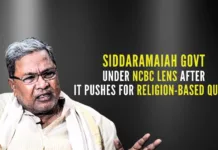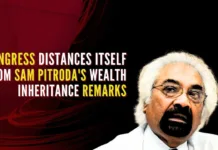
Naxalism is too strong a medicine to administer to a society suffering from poverty. Yet, it is cheap & readily available; so was in vogue since inception.
In all capitalist countries, people do enjoy social security and enjoy various government sponsored benefits. In all socialist/communist countries, people are exploited despite claims by the government that the real power lies with people. With India’s GDP continuously growing, the economic inequality between the top 20% and bottom 20% is increasing. As India will be embracing capitalism more and more social security of its people should increase. A stable society takes care of all of its people. It is high time for the government to have a concrete policy on all issues to stem all kinds of inequalities in the society.
One fact the erstwhile governments overlooked was the inequality that they created when many PSUs were established in backward regions.
Naxalism came into existence claiming to eliminate this very inequality. However, Naxalism is too strong a medicine to administer to any society suffering from poverty. Yet, it is cheap and readily available; so was in vogue since inception. After all, it is the job of government to ensure that citizens do get equal opportunity irrespective of their economic status. If someone shoulders the responsibility, especially when the government fails, they would be welcomed. And that’s how Naxalism started but it soon mutated into a monster and exploited the poor, whom it was supposed to protect.
It is not that the reasons for its existence are not known. Only there was no sincere action to eliminate these reasons. When Nehru famously said to the people who lost their land to Hirakud project that they should suffer, in the interests of the country, little did he realize that this would become the policy one day. Though the main complaint and demand of Communists (all varieties) was land reforms, land reforms alone cannot solve all the problems. For example, despite claims to success in land reforms in West Bengal, West Bengal could not match the growth of Kerala. Despite being ruled by the same Marxists for long, Kerala could grow because they found an alternative avenue in Gulf to provide jobs that sustained financial influx.
One fact the erstwhile governments overlooked was the inequality that they created when many PSUs were established in backward regions. The neighborhood of these PSUs have not witnessed any development but the locals watched the comfortable lifestyles of the employees working in these PSUs. Be it schools, hospitals or connectivity, PSU employees have access to them, but not the locals. Of course, the employees should have them. After all, they have left the city lives to work in these remote areas. But, can’t the government think to improve the situation in the neighborhood too? The accumulated ‘difference in inequality’ in financial and living standards has forced the government so it is now mandatory for even private industries to spend on Corporate Social Responsibility. Funnily though, even today there is no fool-proof mechanism that ensures neighborhood development.
The other field that needs attention is how India is distributing its natural resources.
The other critical factor that was supposed to be seen was the distribution of royalty or the wealth generated by natural resources. By law, all natural resources belong to the Government of India. So, we have coal mines and power plants in backward states that power the cities and towns in developed states. Surrounding all power industry hubs are many villages that have not seen electricity till last decade. No wonder Naxals can induce the locals against the government. Only three years ago, the government has increased the share of state governments in the mining royalties. But even now, there is no mechanism to share these profits with the locals. The same constitution that says natural resources belong to the government also says India has a federal structure of governance. Of the royalty, if the state government gets some share, why not the exact group of villages or Taluks also get some share, however small percentage that may be? That would ensure sufficient funds to take care of local development.
Even while the land acquisition is allowed to industries (both public and private), should there not be a share of ownership to the local administration. Say a board is created for the villages that have contributed land (for mining or for an industry) and they have a share of 5% in the industries that are established there? The continuous availability of funds through the lifetime of the industry could do wonders in uplifting the life standards of these villages. Initial funds for such board may come from the sale proceedings of land to individuals or panchayats. Guidelines may be drafted on what the money should be spent on to prevent it from being used by individuals. When Chandrababu Naidu was transforming Andhra Pradesh in nineties, local groups were made responsible for execution of community projects like roads, schools and other activities. Letting locals managing developmental activities, coupled with third party audits would ensure the money is properly spent. At least, most of it.
The other field that needs attention is how India is distributing its natural resources. Of course, on water distribution there were direct fights between states because it was too vital and fundamental for survival. How about coal, gas and other minerals? Does it make sense to transport natural gas from Krishna-Godavari basin to Gujarat? Especially by denying the first right to use to Andhra Pradesh? Only the excess amount of resources may be allocated to other states. Or only 50% of available natural resources may be allocated to some other state by the Union of India. As each state has its own kind of resources, there would be a natural balance of trade amongst the states.
Jealousy, Desperation, and Fear are the tools used by the Naxals to induce people against the government.
Finally, policing and politicising the Naxals. Time and again, political parties have supported Naxalites for political reasons. Congress has mastered the art of supporting the Naxals before elections only to take action against them later. In fact, many ceasefire instances only allowed the Naxals to regroup and rearm themselves. All political parties must declare that taking up arms would not be tolerated, for any reason. Political support should never be extended to any violent attempts against the state.
Police action against Naxals should continue with the same vigor till they give up arms. The policy of rewarding the surrendered Naxalites should be withdrawn as it only encourages people choosing it as a short time career. Become a Naxalite, fulfill all sadistic perversions, give up the Gun and become an ambassador of peace – only to join the Urban Naxal. This cycle ensures a continuous supply of violent men to the movement. Though the movement has already become worse than the organized mafia, the intellectual aura provided to it by those in society in the form of solidarity in thought projects them as victims and martyrs. However, filing cases should be done only with proper evidence and arrests be made only after receiving judicial orders. Executing without proper homework often discounts and discredits the hardship experienced by the Police doing the groundwork.
Consider the leftist intelligentsia really want to improve the lives of poor. Even with half their efforts to induce the poor to take up arms, the leftist intelligentsia could organize them into having a robust mechanism that could force the government and contractor mafia in forests. But, if they chose not to allow even the construction of roads, schools, and hospitals, they are not helping their cause, if at all they really care for any cause.
Jealousy, Desperation, and Fear are the tools used by the Naxals to induce people against the government. It is time the government tries to instill and use Hope in the minds of people in Naxal affected areas. Mere assurances may not rekindle hope in the poor minds. Lots of action on the ground need to be visible. In fact, the government could transform the Urban Naxal network as social auditors. The administration should now master the art of making friends with the enemy to counter the stronger enemy. True democracy is the virtue of a matured society. And, it is the responsibility of the government to guide the society so it can mature.
Note:
1. The views expressed here are those of the author and do not necessarily represent or reflect the views of PGurus.
- Prashant Kishor & the quest for opposition - February 2, 2022
- Return of Taliban and the future of the world - August 18, 2021
- Time for BJP to stop quoting Indian History and learn something from it. - May 3, 2021











Transforming urban naxals as auditors?! Making friends with enemy? I doubt you realize the real impact and depth of what you are saying. These urban naxals are hard core communists completely brain washed long ago using the seduction method of KGB. It is virtually impossible to transform them. We, the public, have to call them out and refuse to join in their righteous indignation.